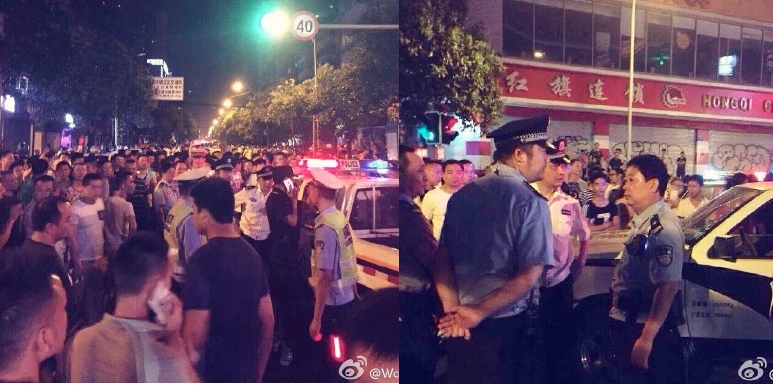
Photos showing a street confrontation between Uber drivers and traffic police on May 10 in Chengdu. Photos taken by Weibo user Wong Pok.
The latest raid on the offices of popular US-based crowd-sourced taxi service Uber, this time in the southwestern city of Chengdu on May 6, has sparked public criticism of local Chinese authorities. Some accused them of showing a vested interest in the taxi industry while ignoring that same industry's poor service, while others were dismayed to see officials clamp down on yet another foreign Internet company .
Uber has established a presence in about 10 Chinese cities. The crackdown on their offices started in Guangzhou, where officials from the city transportation department, police and business-licensing departments seized cellphones and other equipment, and later spread to other major cities.
An official at the Chengdu city transportation commission said the raids were part of a comprehensive investigation into Uber's role in the unlicensed private taxi business. The Chinese government in January banned drivers of private cars from offering such services through mobile apps.
In addition to the office raids, traffic police have targeted Uber drivers. Wong Pok, a training consultant, described on Twitter-like Weibo a confrontation he witnessed on May 10 in Chengdu:
【成都Uber不哭】今晚成都牛市口海椒市附近,交警吊销Uber司机的驾照并没收手机,众多Uber司机到现场声援斥责钓鱼及暴力执法。顺便提一句,今晚#张惠妹成都演唱会#结束,诸多歌迷打不到车,有出租司机喊出不打表百元起价。世间总有一些事,转发也是力量。我下周将申请成为Uber司机,就这样。
Don’t cry Chengdu Uber: Tonight near Nuishikuo and Haijiaoshi in Chengdu, a traffic police officer confiscated a Uber driver's license and mobile phone. Many Uber drivers arrived at the scene to protest against “fishing operations” [undercover police officers pretending to be customers to lure drivers online]. It happened when the Chang Hui Mei concert finished and Chang's fans could not find any taxis available. Some taxi drivers asked for a RMB100 [approximately US$16 dollars] as a starting price without a receipt. In such a world, forwarding what happened is a show of strength. Next week, I will join Uber as a driver. That's it.
The post was quickly removed, but not before it received about 1,000 comments and was reposted a few thousand times.
Though it was one of the first on the ride-sharing scene, Uber has lagged far behind its Chinese imitators who have grown fast and found backing from major investors.
That doesn't mean, however, that web users haven't complained about the crackdown. A number of commenters argued that the role of the government should be to encourage innovation, facilitate transportation and improve the terrible service in the existing taxi industry, but instead authorities are preventing innovation in order to protect business interests.
MRJERRYZHOU, an auto specialist, was discontented about the reality of the industry:
ZF应该赶紧出台一些游戏规则来合法化这个产业,而不是让某组织通过知法犯法的下三滥手段来执法,在人民心中的标准不是Uber,而是便捷和温馨,如果还是那些拒载、脏乱差、爆粗口的出租车来垄断这个行业,那我(ren)们(min)只能力挺Uber!
The government should release new rules to justify the ride-sharing industry, rather than allow some authorities to enforce the wrong laws. What the people need is convenience and good services for taxis. We, the people, will only support Uber if the market is still monopolized by taxi companies, which often offer dirty cars and awful services and whose drivers often deny or even abuse consumers.
Zhu Hai, an economist, believed local authorities were working on behalf of the taxi industry:
①Uber动了一些地方政府的奶酪,于是被查;②利用权力是地方政府获得利益的最有效方式;③专车打破旧秩序时,不愿失去利益的旧势力进行抵抗
1. Uber was investigated because it threatens the interest that local authorities have in the taxi industry; 2. Abusing power is the most effective way for local authorities to get what they want; 3. The traditional taxi power wants to resist change when special cars break the monopoly.
Some even questioned if the crackdown is part of the government's desire to further restrict the country's access to the internet or even build a state intranet, and that Uber being a foreign internet company is a natural target. Weibo user Mr. Tuixiang Moda shared his thoughts:
继广州Uber被查封之后,成都Uber也刚刚被查封,很多人将之归结于地方交管部门的利益,也有人阴谋论为其国内竞争对手的图谋,但从更大的背景来看,杜绝国外互联网应用的壮大,扶持本土替代应用,乃是国家互联网长期战略,其最终指向的是国家局域网,从这一角度来看,Uber在劫难逃!
Uber’s Chengdu office has been visited by Chinese police after a raid in Guangzhou. Many people attribute it to the interests of local transportation regulators, others link it to the manipulation of Uber’s competitors in China. However, from a larger perspective, it could stem from Beijing’s longtime internet strategy which curbs the growth of foreign internet companies and supports domestic alternatives. All of this would lead to a state intranet. So Uber is doomed to be investigated in China!
This certainly isn't the first time a foreign internet company faced a clampdown. In the past, the Chinese government has curbed access to Google, Facebook, Twitter, and now Uber joins them.






